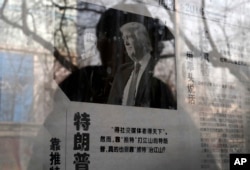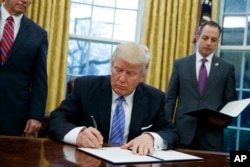There would be no winner from conflict between China and the United States, Chinese Foreign Minister Wang Yi warned Tuesday, seeking to dampen tension between the two nations that flared after the election of U.S. President Donald Trump.
Relations between China and the United States have soured after Trump upset Beijing in December by taking a telephone call from Taiwan President Tsai Ing-wen and threatening to impose tariffs on Chinese imports.
China considers Taiwan a wayward province, with no right to formal diplomatic relations with any other country.
But China is committed to peace, Wang said, after meeting Australia's Foreign Minister Julia Bishop.
"There cannot be conflict between China and the United States, as both sides will lose and both sides cannot afford that," he told reporters in the Australian capital of Canberra.
While seeking to reduce tension, Wang called on global leaders to reject protectionism, which Trump has backed with his "America first" economic plans.
"It is important to firmly commit to an open world economy," Wang added. "It is important to steer economic globalization toward greater inclusiveness, broader shared benefit in a more sustainable way."
Just days ahead of Trump taking office, Chinese President Xi Jinping was in Switzerland as the keynote speaker at the World Economic Forum in Davos, offering a vigorous defense of globalization and signaling Beijing's desire to play a bigger role on the world stage.
Wang said that China does not want to lead or replace anyone, and that as its national strength is still limited it must focus on its own development, according to comments carried on the Chinese Foreign Ministry's website.
"We must remain clear-headed about the various comments demanding China play a 'leadership role'," Wang said.
While Trump's trade policies have spurred concern the United States is entering a period of economic protectionism, China has previously accused Australia of adopting a similar practice by blocking the sale of major assets to Chinese interests.
Bishop urged China to consider joining a pan-Pacific trade pact abandoned last month by Trump, who has said he prefers bilateral deals.
"I want to encourage China to consider the agreement," Bishop said, referring to the Trans-Pacific Partnership.
As China called on nations to be open to offshore investment, Wang said Beijing would link its "One Belt, One Road" (OBOR) policy with Australia's plan to develop its remote northern region.
The program announced by Xi in 2013 envisages investments by China in infrastructure projects, including railways and power grids in central, west and southern Asia, as well as Africa and Europe.
Australia has ambitious plans to develop its Northern Territory, a frontier region with little infrastructure, but efforts have largely stalled for lack of investment.







